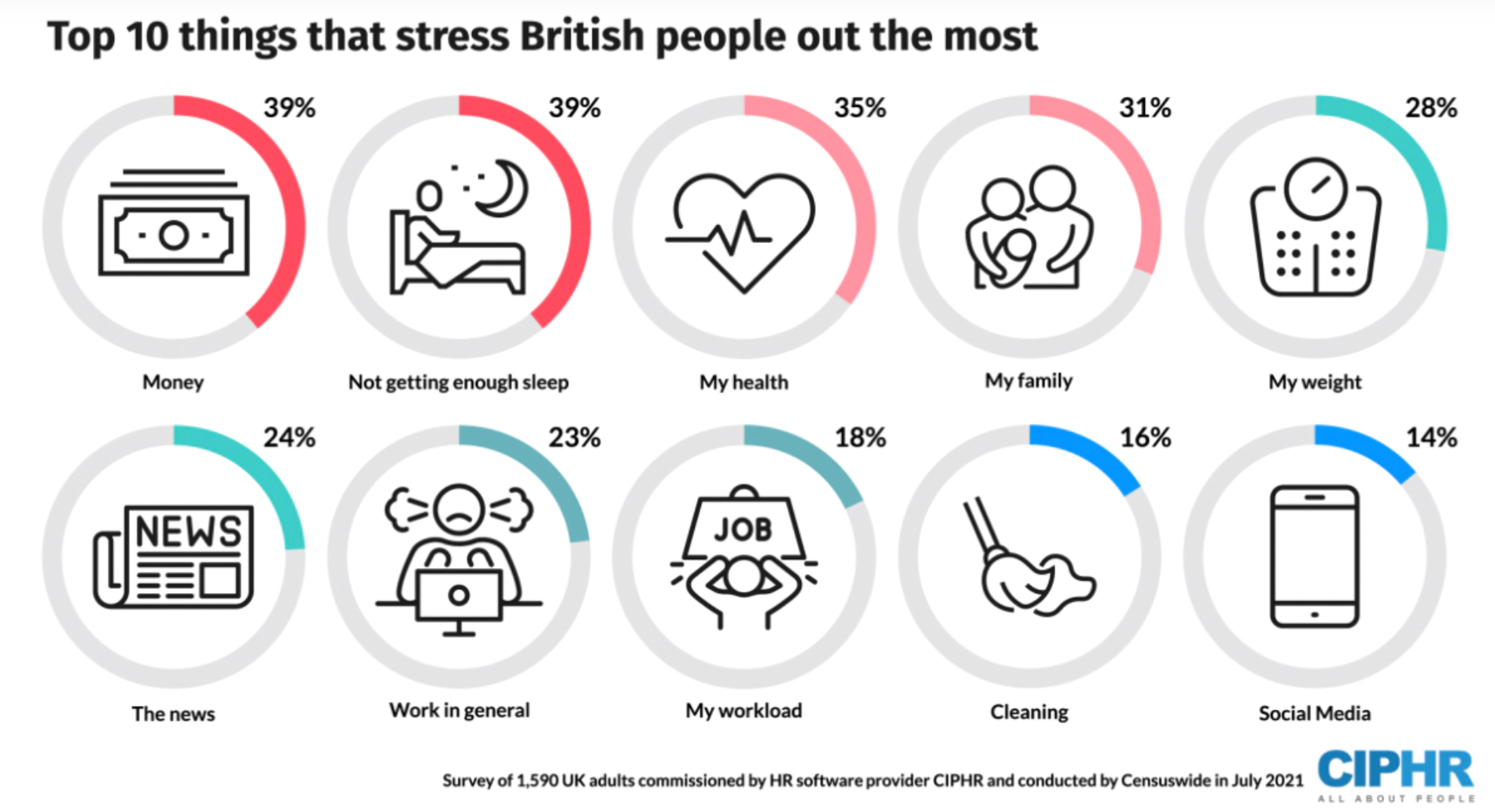Stress Awareness: Improving Well-being At Work
18th Nov 2022

The 2nd November 2022 marked National Stress Awareness Day - with the doom and gloom of the pandemic and now the recession / rising cost of living alongside the winter blues, it’s no surprise that stress levels are peaking and mental health is declining.
What is National Stress Awareness Day?
National Stress Awareness Day is on the first Wednesday of November each year. The day raises awareness about the impact of stress - highlighting how we shouldn’t stress about situations out of our control, what causes stress and how it can be managed.
We face stress in our daily lives, whether that be at work or in our personal life, so it’s inevitable that the two overlap and intertwine. It’s easy to say work and personal life should be separated but that’s not how mental health operates - it affects all areas of life.
When it comes to work, employers have a level of responsibility towards employees' mental health and well-being. So, let’s take a look into what causes stress at work and how this can be managed.
What causes stress at work?
Stress at work is often unavoidable and it impacts individuals in different ways. Some employees, for example, work well under pressure; for others, this may cause high amounts of stress. When pressure and stress become unmanageable this can cause burnout, a decline in employees' health and a reduction in productivity.
Workplace stress statistics (CIPHR) in the UK show that 1 in 14 adults feel stressed every single day and these are the reasons for what causes stress at work:

Whilst in the US 40% of workers reported their job was very or extremely stressful with the following factors being the reason for stress at work:
- Workload (41%)
- People issues (32%)
- Juggling work and personal life (18%)
- Lack of job security (9%)
A stressed employee doesn’t make a productive or happy employee and will likely result in higher absenteeism. Not only does this have an effect on individuals, but team members and the company as a whole. So what can employees and employers do to manage stress at work?

How to manage stress at work?
We previously discussed how mental well-being at work is a must - not a perk and highlighted the benefits of prioritising mental well-being in the workplace. But what can companies do to help manage stress at work?
Company-wide shutdowns
With Christmas upon us, let’s firstly talk about company-wide shutdowns. They are a great way to help tackle burnout, reduce stress and improve mental well-being. It’s a time for all employees, including the leadership team and managers, to completely switch off, spend time with family and friends, and put aside time for self-care.
Provide mental well-being support
Employee benefits such as offering mental health support from a third-party provider open the doors to healthcare, which can be difficult to obtain through the NHS. Companies like Oliva offer proper mental healthcare support through therapy and coaching, with tailored plans for each employee.
Have realistic expectations
Having realistic expectations with workload and what an employee can cope with is vital. For example, an employee shouldn’t be expected to be carrying the workload of a two-person job.
Communication
Communication is important for employees to build good working relationships with their employers.
Deadlines are one instance - you should communicate with employees to work out when a task can be completed and how tasks can be shifted around if something urgent comes up. This feeds into the previous point about realistic expectations.
Having regular check-ins is another way to ensure employees, and also those at managerial level, are getting the support they need. This is also a method for businesses to gain feedback (which should always be two-way). It helps employers establish if there are recurring issues in the workplace - if highlighted by multiple employees - issues can then be addressed and actions are taken to resolve them.
Flexible working
With cleaning, family and health being a few of the top things that people at work stress about, flexible working can help solve this. Working from home means that you can utilise time over your lunch break - time that you’d otherwise spend commuting to carry out cleaning tasks, go to the gym or for a walk. Whilst flexible working can also provide more time to spend with the family, particularly for working parents.
Integrate stress management into your workplace policies
Companies such as Leadfeeder have their own policies and practices in place to support their employees.
We spoke to Natalie Singunda - Talent Acquisition Partner to find out more.
“Let's face it, life can be stressful. Especially in today's climate.
With more people suffering from stress, anxiety, and mental health problems at a higher rate than ever before, it's only natural that this could affect their work.
To combat this, Leadfeeder has put in support services that ensure all employees are able to help combat stress and focus on their well-being.
One of these is a service called Auntie. A service that offers hassle-free online services from mental well-being professionals, that support the mental well-being of employees before problems such as stress, overachieving or finding motivation become overwhelming. Auntie is a preventative, solution-focused service that can be accessed even before the issues escalate to problems, by giving support to employees.
There were a few things going on outside of work in the summer that left me not feeling 100% (they weren't too drastic but I wasn't feeling on top of my game), so, I organised a session with Auntie. By having someone impartial to speak to really helped.
The best thing about Auntie in my opinion (and why I used it), is that there is a low threshold, so we can talk to someone even if we are just having a rough couple of days. You don't have to discuss work-related issues; you can discuss anything that's affecting your mental health.
Additionally, Leadfeeder also offers employees well-being Wednesdays. Every Wednesday we can log on to a virtual well-being session for 30 minutes and take part in classes like yoga, meditation, stretching or breathing- its benefits like this make us feel supported and valued.”
" Mental health problems don't define who you are. It’s something you experience. You walk in the rain and you feel the rain, but you are not the rain. "